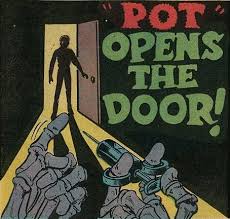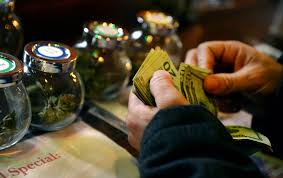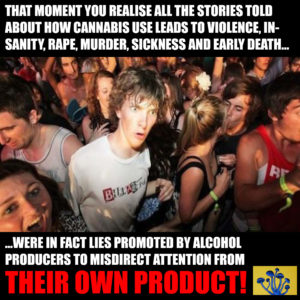
One of the reasons for keeping cannabis illegal is known as the Gateway Drug Effect (or Gateway Drug Story, for the cynical). The logic goes like this: people who try cannabis will like it and, in doing so, come to reason that drugs are awesome, and will then inevitably try heroin and die.
Apparently this happens with such tragic predictability that the phenomenon has taken the name the Gateway Effect – namely, that cannabis serves as a gateway to the wider world of drugs.
This reasoning, wrong as it may be, is almost logical. There is a Gateway Drug Effect, only – the gateway drug is alcohol. There is also a gateway effect related to cannabis, but it’s not what the Government claims it is.
The real gateway effect usually kicks in the morning after one has tried cannabis for the first time. Invariably one has already tried alcohol and discovered what a hangover is. Waking up after having smoking weed for the first time the night before is often accompanied by a sense of relief, as one might have been expecting an alcohol-style hangover only to find the cannabis one is very different.
So that next morning, and that next day, it sinks in that you have been lied to the whole time about cannabis. That evening, you start wondering what else the Government has lied to you about.
And then you’re on a journey down the rabbit hole.
That rabbit hole can take the neophyte psychonaut to some paranoid places. This is natural when one realises that the police officers who came to your high school to tell you that cannabis causes violence and mental illness were lying. They came to you as if they were pillars of the community, and they lied to your face about a medicine that you might have found beneficial.
Did they know they were lying? Probably some of them did and some of them didn’t. The ones that didn’t know were lied to by someone else – but who are these people?
It soon comes to appear that the lying comes from the very top – from the political class itself.
This lying and forcing other people to lie has the effect of devastating the social fabric.
If I go to see a doctor about pills I’ve ordered off the Internet, I don’t know if I can trust them or not. I already know that doctors will quite happily repeat lies told to them by authority figures, whether those figures are in government or the pharmaceutical industry.
A doctor will look you right in the eyes and tell you that cannabis causes depression if their paycheck is provided by a pharmaceutical company who sells an antidepressant that makes more money than cannabis could.
Does it have to be this way?
Teenagers are going through a rite of passage nowadays that is very common. It involves smoking your first joint and realising that you’ve been lied to, and then following the same reasoning described in this article. This rite of passage (Eleusinian Mysteries aside) is a modern thing – people in the recent past were generally more than happy to march into a meat grinder if an authority figure said it was to their benefit.
The astute reader might have observed the paradoxical benefit here – this exact cynicism about the government is what makes it harder for English-speaking people to follow dictators.
Still, there’s surely a better way to shock people awake then by putting an unlucky minority of them in prison and leaving their friends and family to rue the butcher’s bill.
The Government’s strategy of lying about cannabis to the detriment of the people it governs, and then refusing to stop telling lies even when it’s obvious to almost everyone that they are lying, has devastated confidence in authority figures for an entire generation of Westerners.



